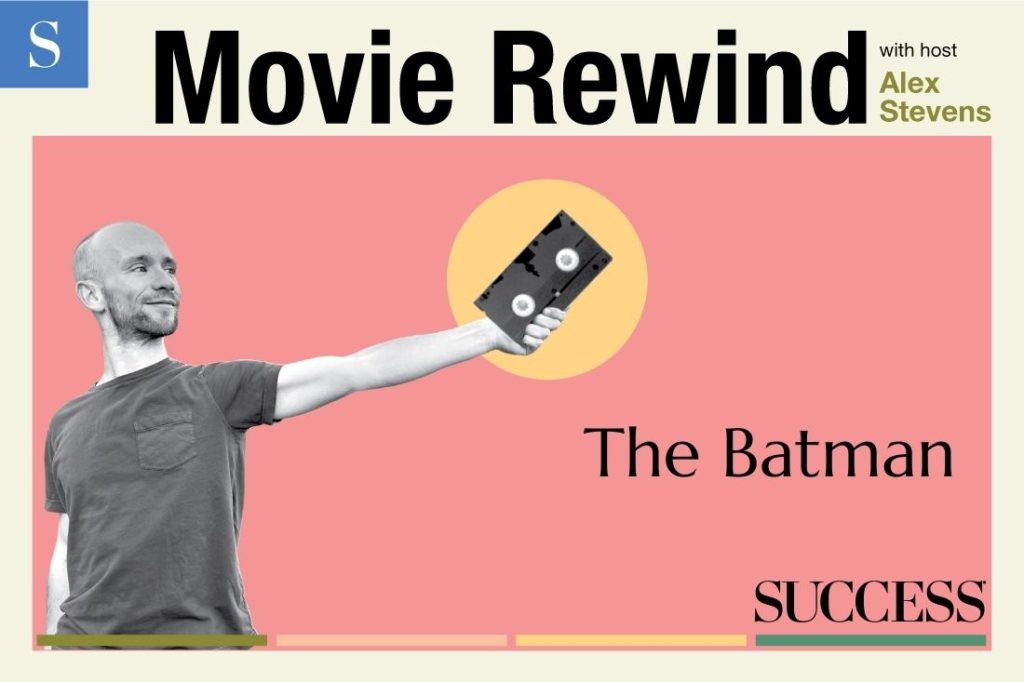Welcome back to SUCCESS Movie Rewind, the podcast where we talk about fear, masks, cages and breaking free from all of those things—this week, anyway. We’re talking about The Batman this episode, so of course fear was on the table for potential subjects of discussion.
If you haven’t seen it yet, The Batman is definitely worth the price of a movie ticket, skyrocketing inflation notwithstanding. And you don’t have to be a Team Edward (Robert Pattinson) holdout to get something out of this movie. If you’re a self-improver, aspiring business leader, entrepreneur or anything close to those descriptors, you’re going to get a lot out of this one.
Even if this isn’t the movie we need right now, it’s the one we all deserve. Let’s do this. What can The Batman teach us? As it turns out, more than enough to turn us into growth machines.
Lesson 1: Don’t be afraid of your fears.
Batman is a privileged orphan who uses fear as currency in his daily life. If that sentence sounds a little strange to you, you may need to go back and watch some of the earlier movies or read the comic books. But let’s start with that—what we always see in Batman movies is how he deals with fear.
Today’s first takeaway is this: Don’t be too afraid of your fears. All due respect to President Roosevelt, but the whole “nothing to fear but fear itself” bit is less valuable now than it was during the Great Depression. In The Batman, we see how a bona fide hero can use fear as a tool to further his goal of ridding the city of Gotham of its criminals. And what I’m here to tell you today is that you can use fear as a tool instead of seeing it as a roadblock.
We see this little message summed up nicely through visual metaphor in the trailer for The Batman. We get a little sneak peak of the Bat-Signal lighting up the sky, and we hear Pattinson’s Batman say this: “When that light hits the sky, it’s not just a call; it’s a warning.”
In other words, while the signal may mean that there’s trouble—which may strike fear into the hearts of Gothamites or even Bruce Wayne himself—it also tells the criminals causing the trouble that they’re about to face the wrath of Gotham’s breathiest whisperer.
That’s using fear as a tool, and it’s a great idea for anyone who is about to embark on a personal development journey. You may fear failure or public speaking or any number of things, and you know you may encounter your fear along your journey. Find a way to make that fear into a motivator, not a roadblock.
Lesson 2: Don’t let your mask become a cage.
In any Batman film or comic book, part of Batman’s journey will involve how he is going to integrate his disparate but inseparable identities of Bruce Wayne and the Batman. Catwoman (played by Zoë Kravitz) sparks that particular journey in The Batman when she rightly points out that Bruce Wayne’s perspective is inescapably one of an obscenely rich white man.
We see Batman running from that identity and how people view him when he is Bruce Wayne throughout the film. Meanwhile, the Riddler is seeking to reveal the truth about Gotham and Batman, and Batman retreats into his hero identity—the one behind the mask—in vain to try to solve the central conflict of this film.
Ultimately, and without revealing too much of the plot, we see Batman find some success when he returns to the identity he has been running from to use it in a new way—a way that might just do some real good.
Don’t let your mask become a cage. No matter who you are or what you’re pursuing, it’s likely that you have parts of your identity that you would rather keep hidden from the world as you pursue your goals. That’s fine and absolutely your choice, but don’t let your chosen mask become a cage from which you can’t escape. Don’t be afraid to return to other versions of yourself when you’re faced with new problems. You might be surprised at some of the solutions you’ll find.
Lesson 3: You can’t transcend personal problems without transpersonal values.
How, exactly, do we get away from the versions of ourselves that don’t help us and become who we’re really meant to be? My third takeaway from The Batman is an answer to that question. Not necessarily the answer, but maybe it will help you along your journey.
I can’t tell you what values to have, but I can tell you with certainty that you cannot transcend your personal problems without transpersonal values, or values that transcend your own personal experience.
In The Batman, we see the contrast between Bruce Wayne’s search for vengeance and pursuit of justice in full color. Vengeance for Bruce has a lot to do with the death of his parents. Justice, on the other hand, is about the crimes against innocent people in Gotham.
Both justice and vengeance are about righting wrongs, but justice is about bringing the world back into balance to undo wrongful acts while vengeance is about returning the pain that befell you specifically due to someone else’s wrongful act. In blind pursuit of vengeance, you’re much more likely to become a perpetrator of injustice yourself. This isn’t a new concept in the Batman universe, but we see it play out pretty clearly in The Batman.
Batman has some blind spots because of what happened to him, and that creates one of the central thematic struggles throughout the entire series. In this third personal development takeaway, I’m positing that we all have blind spots, and we need to have values that transcend our personal experiences in order to avoid doing wrong because of what wrong was done to us.
That’s going to be important as you rise to the top of whatever career, industry, business or area of improvement you’re focused on. You want to reach the top and transcend your personal problems with a clear conscience, and you can’t do that without transpersonal values.
Stay tuned for next week as we cover the 2000s classic, Shrek, loved equally by fans of all ages.




